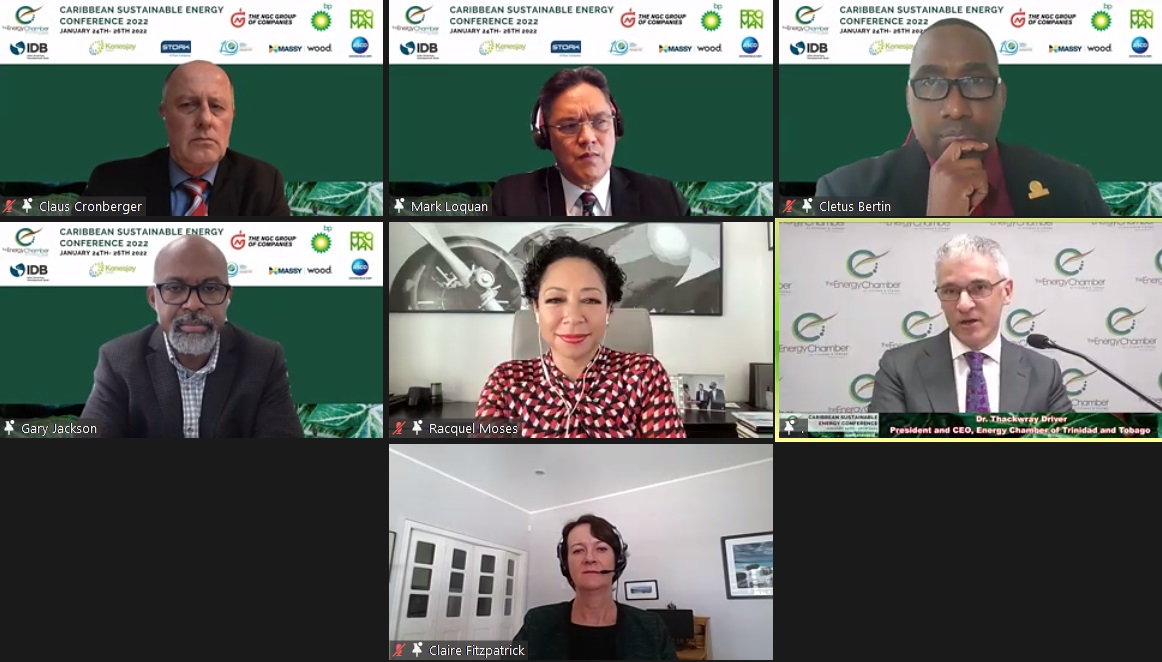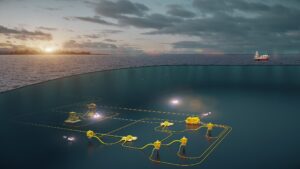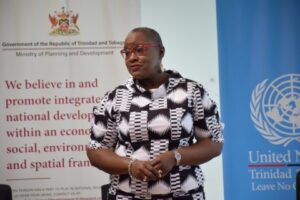
(Energy Analytics Institute, 24.Jan.2022) — Selected highlights from the virtual Caribbean Sustainable Energy Conference hosted by the Energy Chamber of Trinidad and Tobago from 24-26 January 2022 including presentations from Trinidad’s Energy and Energy Industries Minister Stuart Young, The National Gas Company of Trinidad and Tobago Limited President Mark Loquan, and Guyana’s President Mohamed Irfaan Ali, among others.
Select highlights follow:
Trinidad’s Energy and Energy Industries Minister Stuart Young
— “We must still do our part to be able to reduce harmful emissions.”
— “I’m intending and I declare it here today to have the agreements finalized, settled, and signed, executed before the end of February so we can move forward,” Young said referring to the 112.2mw Lightsoure bp project called Lara.
RELATED STORY: Lightsource bp Eyes Construction Of Project Lara
— “I’m happy to say the multinational oil and gas companies in Trinidad and Tobago are stepping forward to assist us as we move towards the use of renewables.”
— “Also in the solar area we’re going to look floating solar projects in our Gulf of Paria… we are also looking to prepare a RFP for the use of lands in Trinidad and Tobago as possible platforms to house more of these solar projects.”
Energy Chamber of Trinidad and Tobago Decarbonization Taskforce Chair Dr. Dale Ramlakhan
— “The decarbonization taskforce aims to engage CCREEE on the role of the private sector in the IRRP process and provide support as necessary.”
— Taskforce target areas: the main focus of the decarbonization taskforce will be industrial, electricity and transportation sectors.
– 90% of all decarbonization in 205 will involve renewable energy through direct supply of low-cost power, efficiency, electrification, bioenergy with CCS and green hydrogen
— Taskforce deliverables: develop a sustainable engagement strategy involving all state sector players including MPU, MPD, MEEI, T&TEC and RIC and the wider public around decarbonized energy plan inclusive of electricity sector, natural gas subsidy, electricity rate review, carbon capture and sequestration and hydrogen.
– Prioritize development of the carbon pricing instrument that can assist in mitigating GHG emissions working closely with the MPD
– Participate in the development of the hydrogen economy for Trinidad and Tobago and the Caribbean region
The National Gas Company of Trinidad and Tobago Limited President Mark Loquan
— The roadmap to 2030: “Working together is no longer optional, it is an imperative.”
— Other ideas he pressed upon: Speed is critical to the transition; accelerate measurement and national reporting on carbon; short to medium term EE along with methane, methane partnerships and use of technology; building and integrating skills in the ecosystem locally and regionally; government policy/direction, financing will be key enablers, but partnerships (public and private) can also drive transition; and gas will continue to play a key role in the energy mix and driving transition locally, regionally, and internationally for decades.
Lightsource bp Group CEO Nick Boyle,
— “By generating your own electricity, remembering it’s the cheapest cost in history, you get two advantages. One, the clear decarbonization of the energy mix… the other advantage is that it allows you to export the newly displaced fossils that you generate. In the case of TT obviously there’s a significant amount of gas and the fact that it is not being used for home use, and because of the fact that electricity is being generated from solar allows an increased amount of gas to be sold and obviously the revenues that are resultant from that.”
— “It doesn’t matter whether it’s an island, or whether is China, US or whatever, this is a significant sized project on a world stage,” Boyle said referring to the Lara project. “It’s a brilliant blue print for the many islands in the Caribbean and further afield around the world.”
— “Solar has potential to decarbonize at scale.”
— “Negotiations are coming to a head, they’re ongoing .. we’re hoping to have them all finalized by the end of February, which means we will start construction, if we hit those time scales, in 2022 with the solar farm being operational in 2023.”
bpTT Regional President Claire Fitzpatrick
— “When it comes to the energy transition – we need a global, regional, local and individual approach and we need leadership at all these levels.”
— “Changed needed requires us to look inwards.”
— “Gas is going to be around through 2050.”
— “Countries have to make economic decision on how to switch… carbon pricing will have an impact on that.”
— “No need to throw everything out to start again,”
RELATED STORY: Claire Fitzpatrick at Caribbean Sustainable Energy Conference 2022
Proman Managing Director Claus Cronberger
— “The right fiscal frameworks need to be in place across the Caribbean.”
“Methanol has created potential to facilitate the energy transition.”
CARILE Executive DirectorDr. Cletus Bertin,
— “Interconnection of grids needs to be under discussion.”
Caribbean Climate Smart Accelerator CEO Racquel Moses
— “There is a lot happening in the region and we don’t really need to look outside the region to learn a lot.”
Guyana’s President Mohamed Irfaan Ali
— “The target of net zero is imperative for the planet… energy security remains a key focus.”
— “The presidents of Brazil, Suriname, French Guiana, and Guyana met last week to explore an energy corridor to integrate energy systems in a move that will create security”
— “Energy security through greater use of renewables will help reduce our carbon footprint.”
RELATED STORY: Net-Zero Emissions by 2050 a Development Priority for the Region—President Ali
Prof. Avinash Persaud, Special Envoy to the Prime Minister of Barbados on Investment and Financial Services, Barbados
— “Fossil fuel producers have 20 years to change their economies.”
— “Barbados is committed to reaching net zero by 2030, not 2050. 2050 is too little too late. If you’re aiming for 2050 that’s why you got the complacency, because no one is going to feel this has got a pressing demand today.”
— “We have 20% renewable energy today. We have applications in for renewable energy that will take us to 70% in a few years.”
— “This is not about technology, it’s about will, money, and fairness. We can make the transition we want to today. We don’t need new technology.”
— “People can’t develop if they have no capital.”
International Renewable Energy Agency (IRENA) Program Officer – SIDS Lighthouses Nadia Mohammed
— “Approximately $9bn will be needed by 2030 to implement the renewable energy targets set out in Caribbean NDCs, of which 33% are for unconditional targets.”
Barbados National Oil Company Limited (BNOCL) Commercial Manager Wesley V. Carter,
— “Given the attractiveness of the renewable energy industry, Barbados is a prime target for large-scale international investors. Through this would initially cause inflows of foreign exchange; the counter speaks to the repatriation of foreign exchange by these investor to their stakeholders.”
____________________
By Ian Silverman, Aaron Simonsky and Piero Stewart. © Energy Analytics Institute (EAI). All Rights Reserved.

